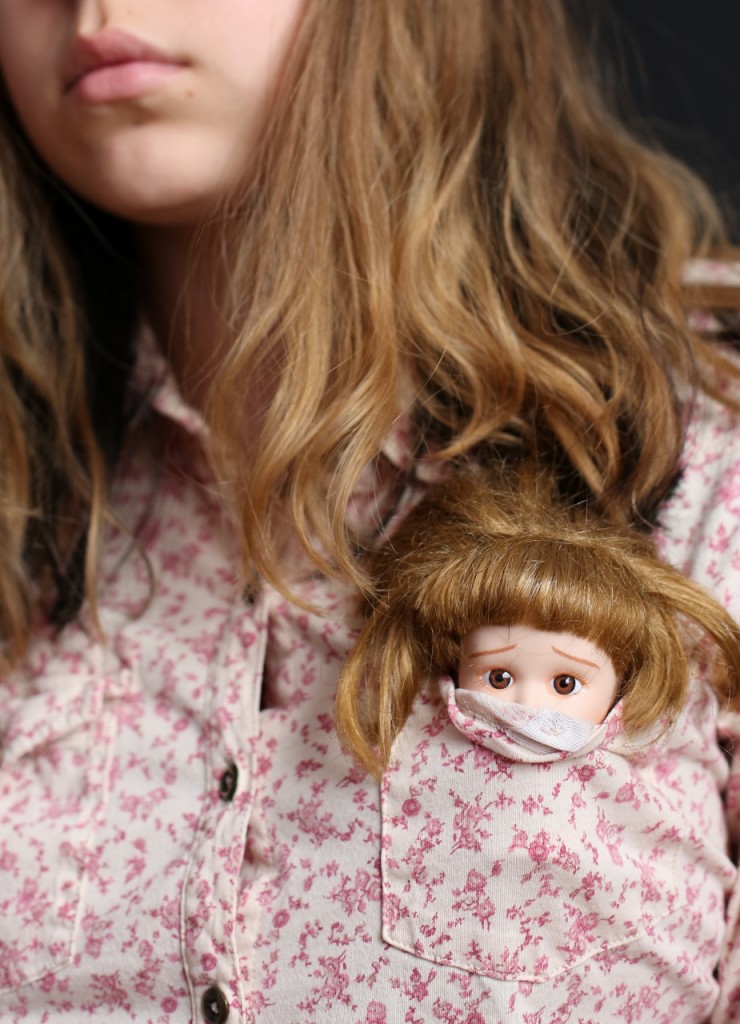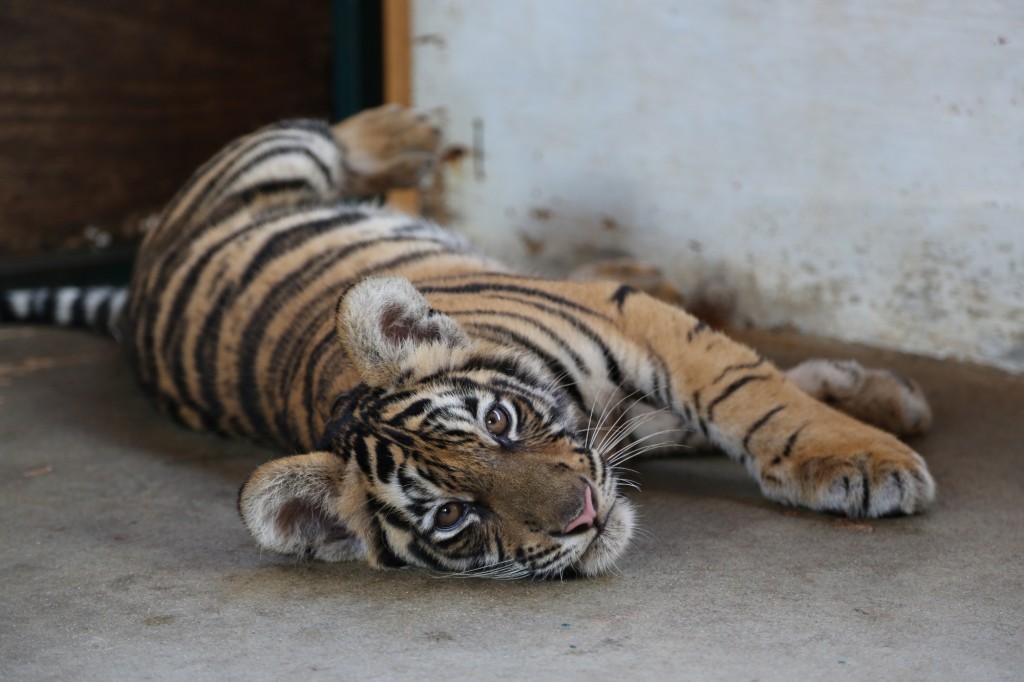
By Lori Jakiela
The scorpion’s name is Cupcake and Cupcake looks pissed.
“Oh, come on,” a zoo official with a walkie-talkie strapped to his waist says. “How scary can it be with a name like that?”
He’s talking to a girl. The girl is on Cupcake’s side of the safety rope. The zoo official is on the other. It’s the girl’s job to pop Cupcake’s carrying case open. Then she’s supposed to reach in and scoop out Cupcake like a gerbil.
From the way the girl is shaking, I’m sure it’s her first time.
I should say, “Honey, are you crazy? Don’t do that.”
I should say, “Sweetheart, how much are they paying you?”
To the zoo official, who is about my age and still wears his baseball cap backwards, I should say, “Why don’t you put your hand in there, dickhead?”
Instead I bring my ten-year-old son over to watch.
•••
How I became this person, I don’t know.
Earlier, I wanted to hang out at the shark tanks. Then on the rickety bridge over Otis the Alligator.
Zoos trigger something primal in me. I don’t pay attention to the cute animals. I’m interested only in animals that, if things were fair and cage-free, would kill me. A zoo visit is about defying mortality, maybe. Most things are. It’s something not to talk about, though, especially with my sensitive ten-year-old son, who worries the snow leopard is depressed, wonders if the komodo dragon is lonely, and likes the penguin house most of all.
•••
We were on our way to check out venomous snakes when I saw the Live Animal Demonstration sign.
How I justify watching:
I read somewhere that most scorpion stings are the same as bee stings.
I convince myself Cupcake is some sort of eunuch, a domesticated nub where a stinger used to be.
I think if someone’s going through the trouble of picking up a scorpion the size of a Pop-Tart, the rest of us should pay attention.
“You’ve got to see this,” I tell my son, who is a more decent person and who would rather not see this at all.
•••
Cupcake’s whole body is a claw. She’s backed into the corner of her carrying case. Inside the reptile house, under ultraviolet light, Cupcake glows like a club kid at a rave. But out here, in the sunshine, she’s so black she’s almost purple, one oil-slick bruise. Her carrying case is pink, plastic, the kind usually reserved for hermit crabs, starter pets. It’s the kind of case kids store Barbie shoes in.
“Look, sweetie,” I say to my son. “She’s going to pick up that scorpion.” I point, like I’ve just said something wise, a life lesson.
I’ve become the muscle-guy from earlier, back at the aquarium. He flexed, pointed to a tank, and said, in a low and serious voice, “What we have right here are fish.” His pretty girlfriend clung to his bicep and cooed.
My son doesn’t coo. He backs up, because he’s not an adult, because the world hasn’t worn his heart to a nub, an overused eraser, because he still feels things.
“Why would she do that?” he wants to know.
The girl is ponytailed, in a powder-blue polo shirt with the zoo logo stitched on the chest. She looks like summer help, an intern, maybe. Maybe she’s getting minimum wage. Maybe this is unpaid life experience and she’s chalking up college credits she’ll have to take out loans to cover.
“Because she’s in training?” I say, and of course it comes out as a question.
“In training for what?” my son wants to know.
•••
I’ve had a lot of awful jobs, terrible internships. “Life training,” people called some of them. None involved handling a scorpion, but still.
•••
Once when I was a flight attendant, a pilot made me hold a door shut during take-off and landing.
There was a mechanical problem—the door wouldn’t lock completely and the handle would start to open on ascent and descent. It was something that would normally ground the plane, but the pilot had a date in D.C. that night—one hot blonde, one strip-club steakhouse, jumbo margaritas served up in glasses shaped like boobs.
The pilot didn’t want a delay.
He said, “Did you bring a parachute?”
He said, “You’ll love the way you’ll fly.”
He said, “Come on, I’m joking.”
He said, “Just don’t let go,” and winked.
I was young. I needed that job. I did what I was told. I pushed my whole weight against the handle and the handle pushed back. I don’t know how dangerous it was really, but I could feel the cold air whistle around the door seal. The steel handle frosted and shook and any minute it seemed the door would burst and I’d jettison out, cartoon baggage, still strapped in my jumpseat and smiling. I’d been taught to smile on the job no matter what. I did that. The door handle inched open and I kept calm and the passengers kept calm. They looked at me like I knew what I was doing and I pretended to know what I was doing.
We went on like that until one guy started hitting his call button. He kept at it through the short flight. He was doing sign language to show he needed a drink, that he might choke and die if he did not get a drink, like this lack of drink was cutting off what little oxygen he had left.
I smiled. He did not smile back. I shrugged and pointed my chin toward the seatbelt sign overhead, which demanded I stay seated, too—sorry, sorry—and that we’d both just have to hold on.
I held on. He kept pressing his call light like a game show buzzer. The door stayed shut. By the time we were on the ground, I was shaking. A red imprint marked my palm from the handle, and the man who wanted a drink was so angry he wrote down my name. He threatened to write a complaint even though I got him snacks and a diet Coke to go.
The pilot heard all of this but pretended not to.
“I think I can, I think I can,” the pilot said. He pulled his pilot-cap low, gangster-style. “Nice work, little engine,” he said, and patted my hip on his way out of the cockpit, off to his margarita-boobs and his blonde and the thick steak he liked juicy and medium-rare.
•••
It’s been a dozen years since I had a job like that, which is maybe one reason I can keep watching the girl and the scorpion now. Empathy is an easy thing to lose, like car keys, like the name of that one actor who played in that movie about scorpions, you know the one.
“You can do it,” the zoo official says as the girl loosens the clasp on Cupcake’s case.
•••
“You forgot what work is,” my father used to say, meaning me and what I do for a living, the way I push words around a page. He meant, watch it. He meant, first you’re on one side of the glass, then the other. He meant, be kind.
He meant, it’s not work if it can’t kill you.
He meant what work does to a body, but work kills people in many ways, I think.
•••
At the entrance to the machine shop where my father worked for thirty years, a sign counted down the days since the last accident. The numbers were flip charts. The numbers didn’t go above two digits much. It was someone’s job to turn those numbers forward and back. Imagine that job.
My father had so many metal shavings in his skin he’d joke that he’d set off metal detectors at airports. He never wore a wedding ring because rings could catch in the machines and take a finger or worse.
“I want to keep all my fingers,” he’d say, “so I can show the foreman where to stick it.”
•••
“I mean, seriously,” the zoo official is saying, “Cupcake?”
It’s a punchline he’s sharing again and again.
•••
When our son was first born, he cried all the time and no one in our house slept much. At first we thought it was colic, but it went on and on and the pediatrician shrugged and said some children are born sensitive like that.
“He’ll get used to it,” the pediatrician said about my son and the world.
My husband worked a terrible corporate job back then. His boss liked to stretch an eight-hour day into a fifteen-hour day too often to count.
Once, after a stretch of six long days in a row, my husband came home and went into the kitchen. He took a serrated bread knife to his forehead. He carved. Blood ran into his eyebrows and down his cheeks. He came out and showed me. He looked proud. I felt sick. But then he called his boss and said he’d been in a car accident and wouldn’t be in to work the next day and maybe the next. I cleaned his forehead with peroxide and we celebrated with drinks and take-out from an Italian restaurant nearby. Everything felt, for a moment, manageable. We remembered we were happy. We remembered we loved each other. Our son slept some. We did, too.
“Most men live lives of quiet desperation,” Thoreau said.
A knife going across a forehead wouldn’t make much of a sound.
•••
“In training for what?” my son wanted to know about the girl.
•••
The girl shakes even more now, like she’s about to stick a fork in a toaster. Cupcake’s case is open. Inside, Cupcake flexes her tail, her very operational stinger. I look down at my son, who’s squinted his eyes shut.
The girl tries to breathe. She cups her hand and lowers it into the case.
“Okay,” she says to the zoo official, who’s beaming. “Now what?”
“It’s not what you look at,” Thoreau said. “It’s what you see.”
“Things do not change,” Thoreau said. “We change.”
The girl nudges her hand under Cupcake.
She brings the creature out to show us, a heavy dark heart in her palm.
•••
LORI JAKIELA is the author of three memoirs—most recently Belief Is Its Own Kind of Truth, Maybe (Atticus Books 2015)—as well as a poetry collection, Spot the Terrorist! (Turning Point 2012), and several chapbooks. Her work has been published in The New York Times, The Washington Post, The Pittsburgh Post-Gazette and more. She teaches in the writing programs at The University of Pittsburgh-Greensburg and Chatham University, and co-directs the summer writers’ festival at the historic Chautauqua Institution. She lives in Pittsburgh with her husband, the author Dave Newman, and their children. For more, visit http://lorijakiela.net.

 Follow
Follow
